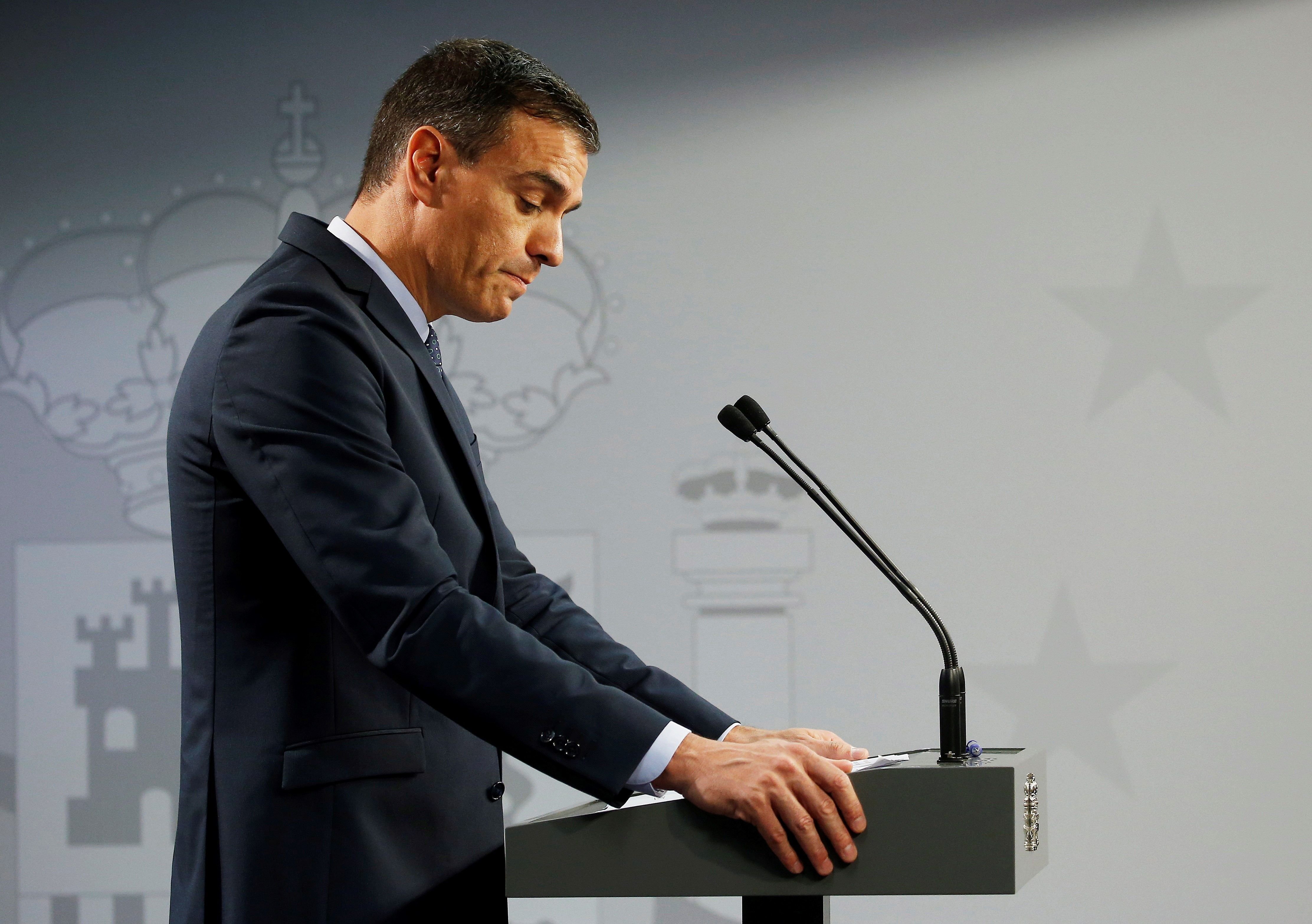Legally, no surveys can be published in the final five days before a Spanish general election. As such, today's polls give us our last chance to see the state of play in the run-up to the election this Sunday, 10th November, the second in under a year. They suggest that support for centre-right party Ciudadanos has collapsed, whilst the far-right Vox is set to build strongly on its breakout results in April.
According to the surveys, neither the obvious right-wing bloc (PP, Ciudadanos and Vox), nor the left-wing bloc (PSOE, Unidas Podemos and Más País) is heading for the 176 seats they would need for an absolute majority to form a government. The newspapers ABC, La Razón, El Español and El Mundo respectively say the right-wing trio will get 156-159 seats, 151-161, 150-166 and 144-160. As for the left-wing trio, their predictions are, in the same order: 151-157, 150-158, 147-162 and 156-170. This means that, although they're all close, only El Mundo predicts the left-wing parties will be the largest group again, as they were in April.
The main parties
Common opinion in Spain says that one of the reasons Pedro Sánchez called the election was a belief, based on internal polling, that PSOE would increase its number of deputies in a new election. Now, only El Mundo (118-126) gives them a chance of bettering their result of 123 seats in April. At the other end, El Español puts them as low as 110-119.
The big loser in April was PP, getting just 66 seats, less than half of the number they had had during the previous legislature. All the surveys today suggest they'll make something of a recovery on Sunday. Only El Mundo's range (89-97) gives them a chance of getting under 90 seats; La Razón (99-107) finds they could comfortably break the barrier of three figures.
The big story the results suggest, meanwhile, is who could come in third place. Founded in 2013, the far-right party Vox, which won its first 24 seats in the Congress in April, is now poised, according to all four surveys, to leapfrog past both Ciudadanos and Unidas Podemos. As ABC would have it, they could win as many as 49 seats; La Razón, whilst still putting them in third place, is notably more cautious, putting them on 37-39. It should be noted that polls before April's election overestimated how well the far-right party would eventually do.
All four papers suggest Unidas Podemos will remain in fourth place, but this time ahead of Ciudadanos. They also all suggest they'll do slightly worse than they did in April when they got 42 deputies. El Mundo (35-40) and El Español (36-40) have relatively optimistic forecasts for the left-wing party, but ABC has them as low as 28-31.
Last of the main parties standing everywhere in Spain is Ciudadanos. In April, they built on the 25 deputies they had to get 57. Now, all the surveys have them losing all that progress, and collapsing further still. El Mundo put them on 16-19, ABC and La Razón, however, give a precise number and outside of that range on the bottom end: 15.
The other parties
New left-wing party Más País, led by Íñigo Errejón, formerly a leading light of Podemos, is standing in its first Spanish general election. As Más Madrid it won 20 of 132 seats in the Madrid Assembly and 19 of 57 seats in the city hall in May. The platform had, however, been formed to support Madrid mayor Manuela Carmena's re-election bid, an objective in which it failed, after which she left the new party. All the surveys other than El Español (1-3) suggest it will get 3 or 4 seats in the Congress.
As for the Catalan parties, the surveys all find ERC could get up to 15 seats, which would repeat its result from April, its best ever performance in a Spanish general election. JxCat is similarly predicted to be able to get as many deputies as it did in April, namely 7, but not more. Standing for the first time in a Spanish general election, CUP is predicted by El Español to get 2-4 seats and by La Razón to get 2.
As for turnout, ABC predicts it will be 70.5%, La Razón 67.1% and El Mundo 72%. The fieldwork for the polls was conducted over different periods over the last two weeks of October and the first days of November. The number of interviews was 7,900 for ABC, 4,758 for La Razón, 1,100 for El Español and 1,800 for El Mundo.
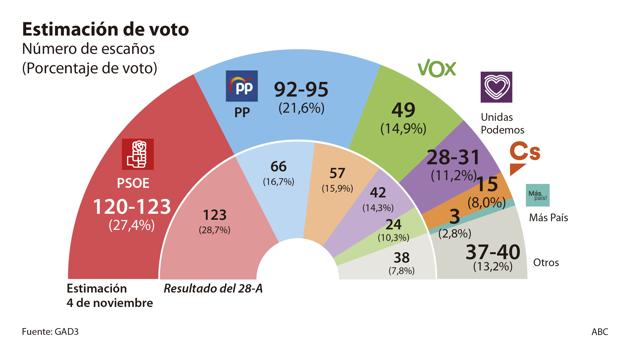
Source: ABC
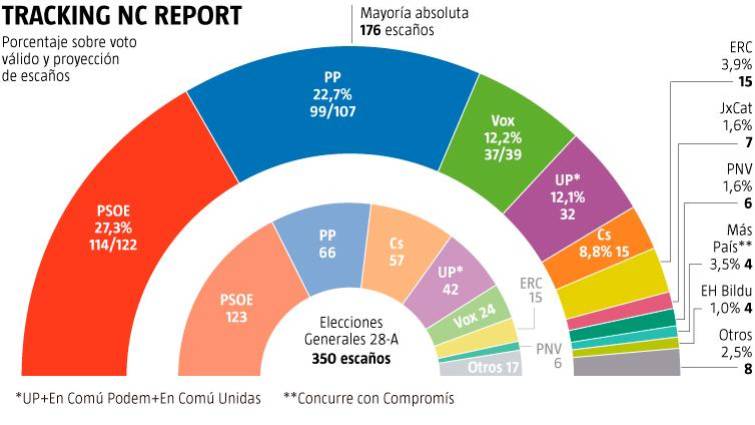
Source: La Razón
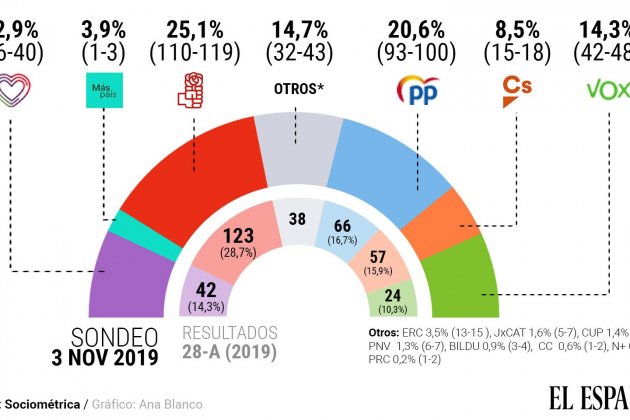
Source: El Español
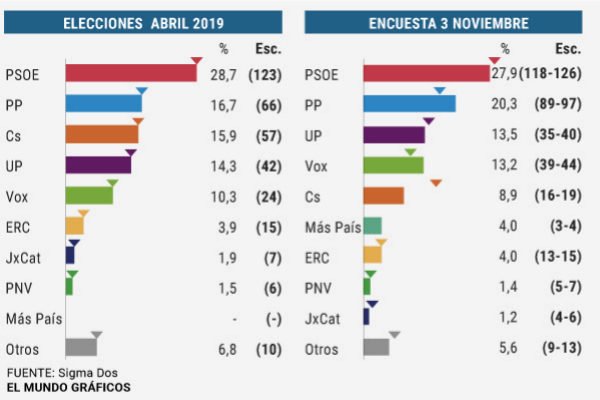
Source: El Mundo

